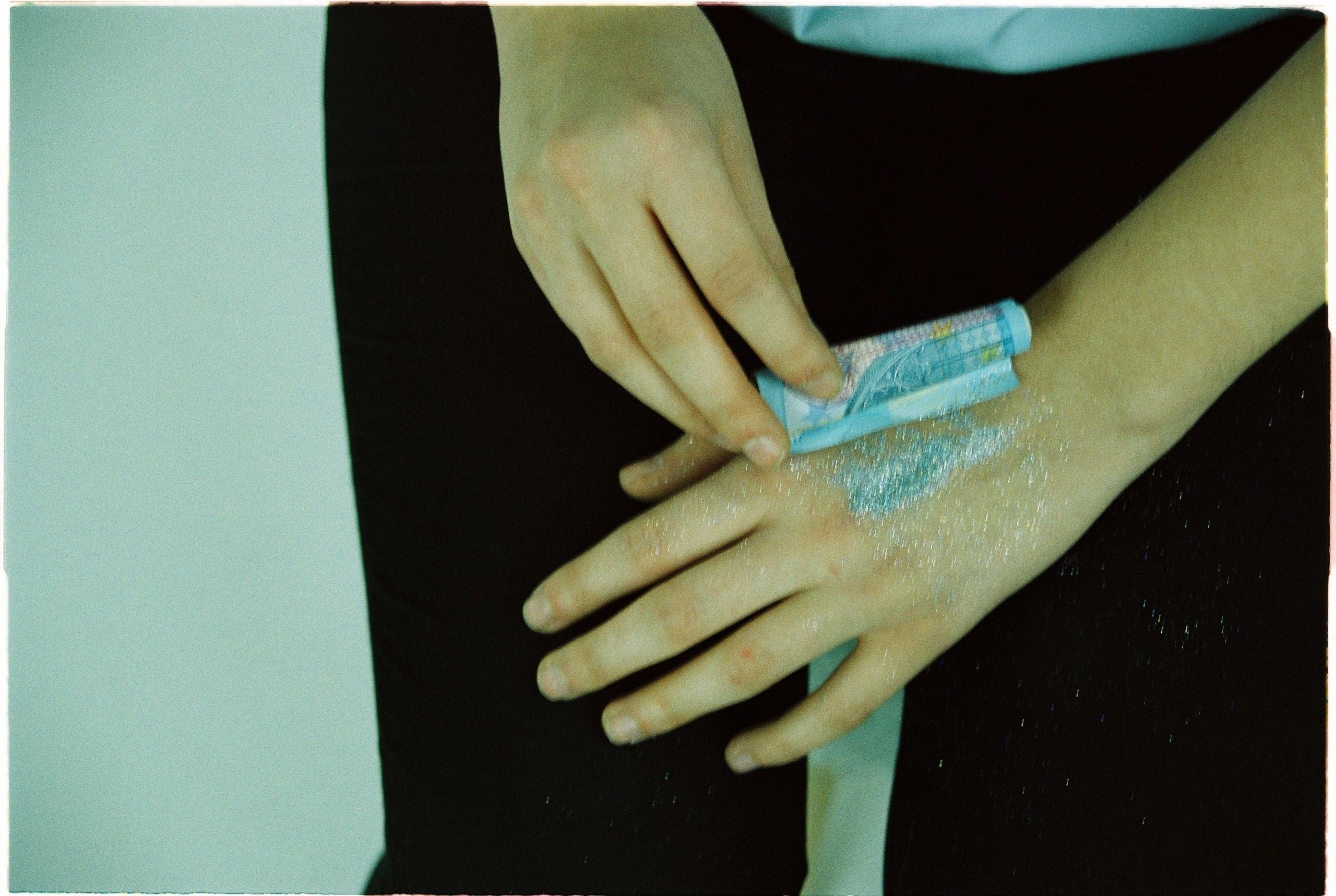[Written by Annegret Maja Fiedler]
[Image by Kate Zápražná]
DISCLAIMER: This guide does not encourage drug use and is for educational purposes, only. The supply, possession and consumption of any form of drugs can lead to serious legal consequences, emotional damage and death.
If you are reading this, you would like to know more drugs. You or someone you know has probably used drugs recreationally. To set the mood: Alexa, play Beethoven’s 5th Symphony in C Minor.
Yes, substances altering the functions of your body such as alcohol, caffeine, nicotine, cannabis, poppers, ketamine, MDMA, cocaine and LSD are drugs. Do you think using or struggling with drugs, obtained without a medical prescription, makes you a bad person? This is a question closely related to a fascinating, yet toxic, stigma surrounding them. While using drugs out of curiosity may have killed the cat, ineffective prohibition laws may be responsible too. This guide aims to introduce an approach between curiosity and prohibition revolving around drugs, which is drug harm reduction. It can educate those who are curious about drugs and prevent the risks associated with drug use, which prohibition, alone, cannot accomplish. It does not endorse stigma revolving around drug use and addiction. Additionally, it intends to maintain an open, educational and supportive safe space.
Drug harm reduction lowers negative effects caused by drugs and could save millions of lives. It is a necessity where, despite strict prohibition laws, deaths caused by drugs persist. In Scotland alone, alcohol leads to an annual 3,700 deaths (Alcohol Focus Scotland, 2008). Additionally, last year, 934 people in Scotland have died from overdoses from other controlled drugs (Carrell, 2018). While laws intend to keep the public safe, they may favour profit over public health and racism. For example, alcohol and tobacco have caused more damage to public health than any other recreational drugs, but they are legal due to their economic importance (Matthews-King, 2018). Furthermore, cannabis possession has been cited to arrest a disproportionate number of people of colour, which highlights how laws are intertwined with racism (Drug Policy Alliance, 2018). Besides prohibition, cutting funding towards facilities providing awareness and help for anyone curious or affected by illegal drugs will not effectively prevent drug use. The demand for drugs, addiction rate, as well as incarceration numbers due to drug related offences will continue to rise. Deaths due to untested drugs, including high-strength ecstasy and fentanyl-laced cocaine, will also continue to occur (Gash, 2016). Improving public education, drug testing availability, and offering more personalised treatments to support addicts would be far more effective than prohibition alone.
For whichever reason you may choose to take recreational drugs, which also include alcohol and tobacco, the following points must be considered:
- Abstinence is the most effective method for avoiding the risks of drug use.
- You should never feel forced into doing drugs. Do not take them if you feel uncomfortable about them. Trust your gut. You will not have an enjoyable experience on a recreational drug you have been feeling anxious about all day. Do not take them to impress others.
- Educate yourself. Learn from sites such as wearetheloop.org/club-drug-info, release.org.uk/drugs-law/drugs-a-to-z or PsychedSubstance on YouTube. Learn about the following:
- Physical and mental health risks
- Short and long-term effects of the drug
- Is there a hangover or a comedown?
- Testing the composition and purity
- Preventing negative experiences
- Interactions with other drugs
- Duration of the effects
- Test your drugs. You cannot be certain about the contents or purity of a drug through visual inspection and smell. The Loop is a non-profit company, which provides drug-testing services at festivals and nightclubs. If you do not have access to testing services such as those provided by The Loop, order a testing kit. Sites such as reagent-tests.uk provide guidance, detailed instructions, and reliable kits shipped in discreet packaging. A reagent will last for a year and can cost as little as £5.50, including shipping.
- Reflect on your priorities. Think about the ones and activities you love. Could drug use also affect your self-worth, career, finances or health?
Negative impacts caused by recreational drugs can be minimised or prevented through access to open discussions, educational resources and support without stigma. There is no shame in curiosity if it does not lead to harm of yourself or others, physically or emotionally. Reliable sources mentioned here can provide opportunities to learn about recreational drugs. There is also no shame in seeking help or advice if you find yourself struggling with recreational drugs. For support, please contact Release (release.org.uk/helpline), the Glasgow Drug Crisis Centre (0141 420 6969) or the counselling services available on campus.
References
Alcohol Focus Scotland (2018). Alcohol causes 3,700 deaths in Scotland every year. [online] Alcohol-focus-scotland.org.uk. Available at: https://www.alcohol-focus-scotland.org.uk/news/alcohol-causes-3,700-deaths-in-scotland-every-year/ [Accessed 23 Sep. 2018].
Carrell, S. (2018). Scotland records highest level of drugs deaths in Europe. [online] The Guardian. Available at: https://www.theguardian.com/society/2018/jul/03/scotland-records-highest-level-of-drugs-deaths-in-europe [Accessed 23 Sep. 2018].
Drug Policy Alliance (2018). Race and the Drug War. [online] Drug Policy Alliance. Available at: http://www.drugpolicy.org/issues/race-and-drug-war [Accessed 23 Sep. 2018].
Gash, T. (2016). Prohibition doesn’t work. The UK needs a more enlightened drugs policy | Tom Gash. [online] The Guardian. Available at: https://www.theguardian.com/commentisfree/2016/jul/29/prohibition-doesnt-work-uk-needs-enlightened-drugs-policy [Accessed 1 Oct. 2018].
Matthews-King, A. (2018). Alcohol and tobacco are by far the worst drugs for human health, global review finds. [online] The Independent. Available at: https://www.independent.co.uk/news/health/alcohol-drinking-smoking-drugs-addictive-health-worst-bad-cannabis-cocaine-amphetamines-opioids-a8345741.html [Accessed 23 Sep. 2018].

